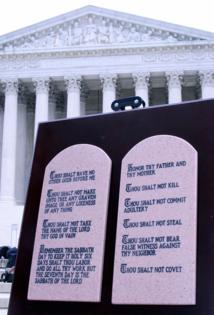John M. Crisp: What were those other 5 Commandments?
Published in Op Eds
In the 1981 film “History of the World, Part 1,” Moses, played by director Mel Brooks, descends from Mount Sinai bearing three stone tablets engraved with the Fifteen Commandments that convey the laws of God to man.
Moses—butterfingers!—fumbles one of the tablets, which shatters into fragments at his feet. Abashed but nonplussed, Moses presents the Israelites with the, uh, Ten Commandments that are left. I wonder what the other five were.
Hold that thought while we consider the 10 that we have.
On June 19, Louisiana’s Republican Gov. Jeff Landry signed a bill requiring that the Ten Commandments be displayed in every public classroom from elementary school through university “on a poster or framed document that is at least eleven inches by fourteen inches” and “printed in a large, easily readable font.”
Critics wonder how this could possibly be constitutional, since the First Amendment’s Establishment Clause clearly forbids the government making any law “respecting an establishment of religion.” In fact, the courts have rejected efforts of other states—Kentucky, Texas, Oklahoma, Mississippi, South Carolina—to enforce the posting of the Ten Commandments.
That’s why defenders of the Louisiana law rely on what they say are the Commandments’ cultural and historical—that is, secular—roots, which is reminiscent of the rationale that the Supreme Court uses to justify religious references such as “In God We Trust” on our coinage or “under God” in the Pledge of Allegiance.
This is sometimes called “ceremonial deism,” which protects such usages from Establishment scrutiny because, as Justice William Brennan wrote in 1984, “they have lost through rote repetition any significant religious content.”
In other words, it’s OK to have prayers before legislative sessions or to engrave God’s name on our nickels precisely because such acts have been drained of their religious content.
It’s hard to see how this is healthy for either Church or State.
Isn’t the point of the Ten Commandments that they came directly from God? If you think of them merely in cultural or historical terms, are they really any better than the rules that every culture sets up so that people can live together?
But here’s a bigger problem: It might surprise some proponents of the Louisiana law that the Ten Commandments aren’t actually in the Bible. You can find several versions of them in the Old Testament—Exodus 20, Exodus 34, Deuteronomy 5—but the Commandments posted in Louisiana classrooms will be an edited, abbreviated version that leaves out relevant context.
For example: “Remember the sabbath day, to keep it holy.” But this doesn’t mean much without the context: On the sabbath “thou shalt not do any work, thou, nor thy son, nor thy daughter, thy manservant [that is, slave], nor thy maidservant [again, slave], nor thy cattle.” So, on the sabbath, no work. None. By anyone. Got that, kids? This includes homework.
Or: “Thou shalt not make unto thee any graven image.” Why? Because God is a “jealous” god who will visit “the iniquity of the fathers upon the children until the third or fourth generation.” The context puts teeth into the commandment.
Or: “Thou shalt not covet.” The context suggests that this commandment applies only to men, as it forbids coveting your neighbor’s house, his manservant [slave], his maidservant [slave], his ass or his wife, but says nothing about coveting your neighbor’s husband.
Otherwise, the Commandments provide some rules so obvious—"Thou shalt not kill”; “Thou shalt not steal”—that nearly every culture has adopted some version of them. They’re not exactly inspired.
But back to the five commandments that Moses fumbled in Mel Brooks’s imagination. How about these?:
Thou shalt not enslave other people.
Thou shalt treat men and women exactly the same.
Thou shalt not hit the children, ever.
Thou shalt not discriminate against anyone, including Black and brown people and LGBTQ+, for I, the Lord thy God, made them all.
Thou shalt do unto others as you would have them do unto you.
While we’re at it, how about a Sixteenth Commandment, from comedian George Carlin’s brilliant riff on the Ten Commandments:
Thou shalt keep thy religion to thyself.
___
©2024 Tribune Content Agency, LLC







Comments